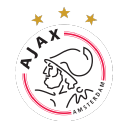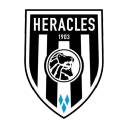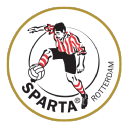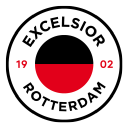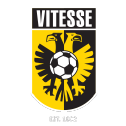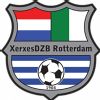Tales of the gods and monsters of Greek and Roman mythology have been told for millennia, and they continue to resonate to this day. Hollywood has produced countless epic movies based on the heroes of antiquity, while sportswear giant Nike is named after the winged Greek goddess of victory.
In football, Italian giants Juventus derive their name from iuventus, the Latin word for youth (which is ironic, given their nickname is "The Old Lady"), while fellow Serie A side Atalanta are named after the Greek heroine famed for her hunting, running and wrestling prowess. However, it is Dutch football which is littered with the most classical references.
This season the 18-team Eredivisie, the top tier of Dutch football, contains three clubs whose names have been inspired by Homer's epic poems "The Odyssey" and "The Iliad" and two teams with names derived from Latin. The nomenclature of Ajax, Sparta Rotterdam, Heracles Almelo, Vitesse and Excelsior as well as lower-division side Achilles '29 can be traced back. So why did these teams adopt mythological names from the other side of Europe?
Unlike in most other parts of the world, where football originated as a working-class sport, the game in the Netherlands was played more commonly by the educated middle and upper classes, who founded teams in the late 19th and early 20th Centuries.
"A lot of children were not going to school, especially the poorest children," Dutch sports historian Jurryt van de Vooren told ESPN. "By using all those names, they [the richer members of society] could show they had some good classic education.
"They went to school where they had Greek lessons and Latin lessons ... You could prove you were one of the better situated people of society. They could show they were educated by using names like Ajax or Excelsior and all the other names you can find."
Here, with the help of Van de Vooren, we look at how each club took their name from the classical age and what they mean.
- Stream LIVE: PSV vs. Ajax, Sunday 10/29, 9 a.m. ET, ESPN+
- Stream on ESPN+: LaLiga, Bundesliga, more (U.S.)
Despite their struggles at the start of this season, Ajax's four European Cups and 36 Eredivisie titles make them one of the most successful and famous clubs in Europe. Some of the most-celebrated players of all time have pulled on their famous red-and-white jersey, from all-time greats such as Johan Cruyff and Marco van Basten to two of the most prolific goal scorers in the game's modern history, Zlatan Ibrahimovic and Luis Suárez.
The club is named after one of Greek mythology's most famous heroes: Ajax the Great. In "The Iliad," Ajax fights in the Trojan War alongside his cousin, Achilles. Ajax later took his own life with the sword of the fallen Trojan prince, Hector, and so died "unconquered."
Inspired by Ajax's story, three men from Amsterdam -- Floris Stempel, Carel Reeser and Han Dade -- founded the football club and named it after him in 1900. The club's crest is an image in profile of the legendary warrior.
"They were not all high-class educated, but middle-class educated," Van de Vooren says. "One of their fathers was a schoolteacher, which meant he was able to read and to write, which was not common in the 1900s in the Netherlands. And all three boys, they had high-school education ... They knew about the old story of Ajax."
Located in Almelo, a city in the east of the Netherlands, Heracles are back in the Eredivisie after being relegated two seasons ago. The club, whose most recognisable player is one-time Newcastle United loanee Jetro Willems, secured promotion back into the Dutch top flight at the first time of asking last May.
The club is named after Heracles (known as Hercules in Roman mythology,) who is famous for his superhuman strength. Tales of the demigod son of Zeus have inspired a 1997 Disney animated feature and a 2014 movie starring Dwayne "The Rock" Johnson, as well as a long-running TV show in the 1990s.
The oldest club in the Netherlands (formed in 1888), Sparta Rotterdam have won six Dutch league titles. They returned to the Eredivisie in 2019 after spending a season in the second tier.
Sparta are named after the ancient city-state in Greece famed for its military might and fierce citizen-soldiers, immortalised in the 2006 movie "300."
The club from Rotterdam have had an encouraging start to the 2023-24 season; they are fifth in the Eredivisie after narrowly avoiding relegation at the end of the last campaign.
The club take their name from the Latin word which translates as "higher" in English.
Located in the city of Arnhem, Vitesse sit fifth in the Eredivisie. Outside of the Netherlands, the club were most famous for being virtually a feeder club for Chelsea's young players; 29 of them made the trip to the Dutch city, with previous loanees including Nemanja Matic, Dominic Solanke, Armando Broja and most successfully, Mason Mount.
Vitesse is a Latin word that translates as "speed" or "quickly" in English.
Much like the hero from whom they take their name, Achilles '29 have endured a devastating fall from grace. The club from Groesbeek, a town on the Netherlands' eastern border with Germany, have been relegated four times in the past six seasons and now play in the sixth tier of Dutch football. Before their downfall, Achilles '29 were known as a cup team capable of upsetting bigger clubs, as they did against Heracles Almelo in 2010 and Telstar in 2014.
Achilles was considered the greatest of all Greek warriors who killed the Trojan hero Hector outside the gates of Troy. He was later fatally wounded by Hector's younger brother, Paris, who fired an arrow through Achilles' heel -- the only part of his body considered vulnerable. Hence the term used to describe someone's weak point.
Even the battles from ancient history continue to find new life in the Netherlands. In the country's second city, XerxesDZB, a team in the north of Rotterdam named after the Persian king, compete way down the Dutch league pyramid.
The club, founded as RFC Xerxes in 1904, look enviously across the city at Sparta Rotterdam, the team inspired by the birthplace of Leonidas and his 300 Spartans who were famously defeated by Xerxes in 480 BC at Thermopylae. The two clubs were last in the same division in 1935 before their contrasting fortunes eventually sent them in different directions through the league systems.
Legends lost in era of social change
Despite the trend for adopting mythological team names, as well as more traditional English ones (such as Go Ahead Eagles,) clubs bearing the names of ancient heroes are far rarer in Dutch football today. It wasn't until around the time of the First World War that football became popular among wider society in the Netherlands, resulting in classical names being replaced with Dutch alternatives.
The Netherlands remained neutral throughout the war and football provided an effective outlet to the traditionally working-class soldiers. The sport contributed to the fostering of a less hierarchical society and helped dispel notions of an uprising at a time when social revolutions were occurring in Europe.
"We can see after the Great War, there is a change in the language which is used by the football players because more people from the lower classes after the Great War were also liking football." Van de Vooren says. "They started their own football clubs and they didn't understand the English words. The shift from English to Dutch in the Netherlands is the shift from football as an elite sport to a popular sport."
The change towards the adoption of Dutch names accelerated as the country's league system began to take shape.
"It was possible in 1900 to use a club name which already existed, but later it became more and more difficult to do," Van de Vooren explains. "The example is Feyenoord. [One of] their first names was Celeritas [meaning "swiftness" in Latin], which is also a classical name. But then they were going to a higher league in which a club was already playing with the name Celeritas which was older so they had to find a new name ... Slowly then you can see it's stopping all the classical names because they were all used already."
While the influence of Greek mythology and Roman antiquity on Dutch society has understandably waned throughout the years, the names of its football clubs have ensured their legend lives on to this day; the captain of Netherlands' national team, Virgil van Dijk, shares his first name with the Roman poet who wrote "The Aeneid," an epic poem about the foundation of Rome. Intentionally or otherwise, he is continuing a 150-year-old trend that was inspired by stories first told almost 3,000 years ago.

